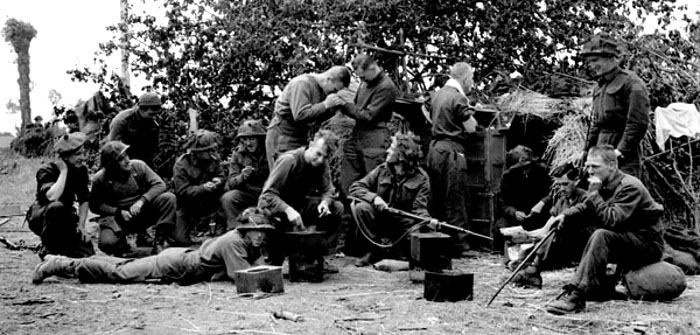Topic: Discipline

Infantrymen of Lieutenant D.S. Barrie's platoon of The Highland Light Infantry of Canada relaxing during a rest period, France, 20 June 1944. Location: France. Date: June 20, 1944. Photographer: Ken Bell. Mikan Number: 3205673. From the Library and Arcives Canada virtual exhibit "Faces of War."
Have you thought much about why your men go AWL?
Canadian Army Training Memorandum, No 39, June 1944
Whether you have or haven't, you should be interested in the survey of the causes of AWL and desertions, made by the Research and Information Section, NDHQ.
Based on replies in Morale Reports from officers of 200 units, the survey finds that most AWL occurs at the end of ordinary week-end leave, furlough, or special leave, (agricultural, industrial, etc). Desertion is mainly a "prolonged delay in return".
In order of frequency of specification, the principal causes of absenteeism are:
(a) Failure of the leave system to meet individual requirements.
(b) Dislike of the Army.
(c) Trouble at home.
(d) Exacting and monotonous duties.
(e) Unattractive, lonely and isolated surroundings.
(f) Homesickness.
(g) Family influence.
(h) Hope for discharge and higher wages outside.
(i) Waiting around for postings.
(j) Dissatisfaction with Corps.
(k) "Atlantic" Fever (Fear of going overseas).
(l) Ignorance.
(m) Faulty Esprit de Corps and Poor Leadership.
(n) Women.
(o) Drunkenness.
It is pointed out that men seldom pack up with the intention of leaving their unit for an unwarranted length of time. Usually it is after they have gone on leave that they are tempted to prolong the holiday for a little, and sometimes for an indefinite period. Rare leaves, compassionate circumstances, travelling time, unfair and arbitrary restrictions, and inconvenient train schedules only add to this temptation.
Ignorance of the compassionate leave privileges available is one of the prime reasons for absenteeism. All offrs should see that their men understand these privileges, so that when they have just reason for desiring leave this may be granted.
Since much AWL is minor and unpremeditated most offrs contributing to the survey naturally tended to concentrate their attention on those who habitually go "on the loose". It was found that these were of 4 main types:
(a) Irresponsible and undisciplined individuals who find it difficult or impossible to conform; they may be products of faulty social teaching or persons whose civilian record does not bear examination.
(b) NRMA soldiers, among whom are many "reluctant patriots".
(c) "Homesick boys".
(d) Soldiers who are below average mentally or who are emotionally unstable.
While it is generally the individual and his own reasoning that results in his going AWL, it is interesting to note that tps at different levels of trg exhibit certain characteristics peculiar to themselves and to the role they are playing. For example, it is found that in Corps Training Centres and in Operational Units the chief cause of illegal absenteeism is lack of Leaves; in Infantry Regiments and Trained Soldiers Units, Trouble at Home and Family Influence; in Basic Training Centres, Lack of Discipline and Homesickness; in HWE and RCA, Boring and Exacting Duties; and also in RCA, the generally isolated and miserable locations.
Corps Training Centres and Trained Soldier Units are chiefly subject to the demoralizing effects of waiting around for postings and "Atlantic" fever. Most affected by corps reallocations are Basic and Corps Training Centres.
Now, what solutions can be tried to remedy these problems? Recommendations offered by the survey are:
(i) The unit leave system revised to provide a more equitable distribution of leave privileges.
(ii) Rotation of personnel and of units engaged in monotonous work.
(iii) Inculcation of respect for mil law and duty from the recruit level on, which also implies full realization of what is constituted in them.
(iv) Stem and impartial handling of offenders.
(v) Close co-operation of mil and civil authorities in dealing with desertion.
(vi) Combining furlough and special leaves in certain cases where men are stationed great distances from home.
(vii) A good extra-curricular program -sports, movies, etc.
These are only recommendations, but remember that well disciplined soldiers, who are kept busy with good interesting trg programmes are NOT likely to go AWL. Think this over and then survey your situation.

